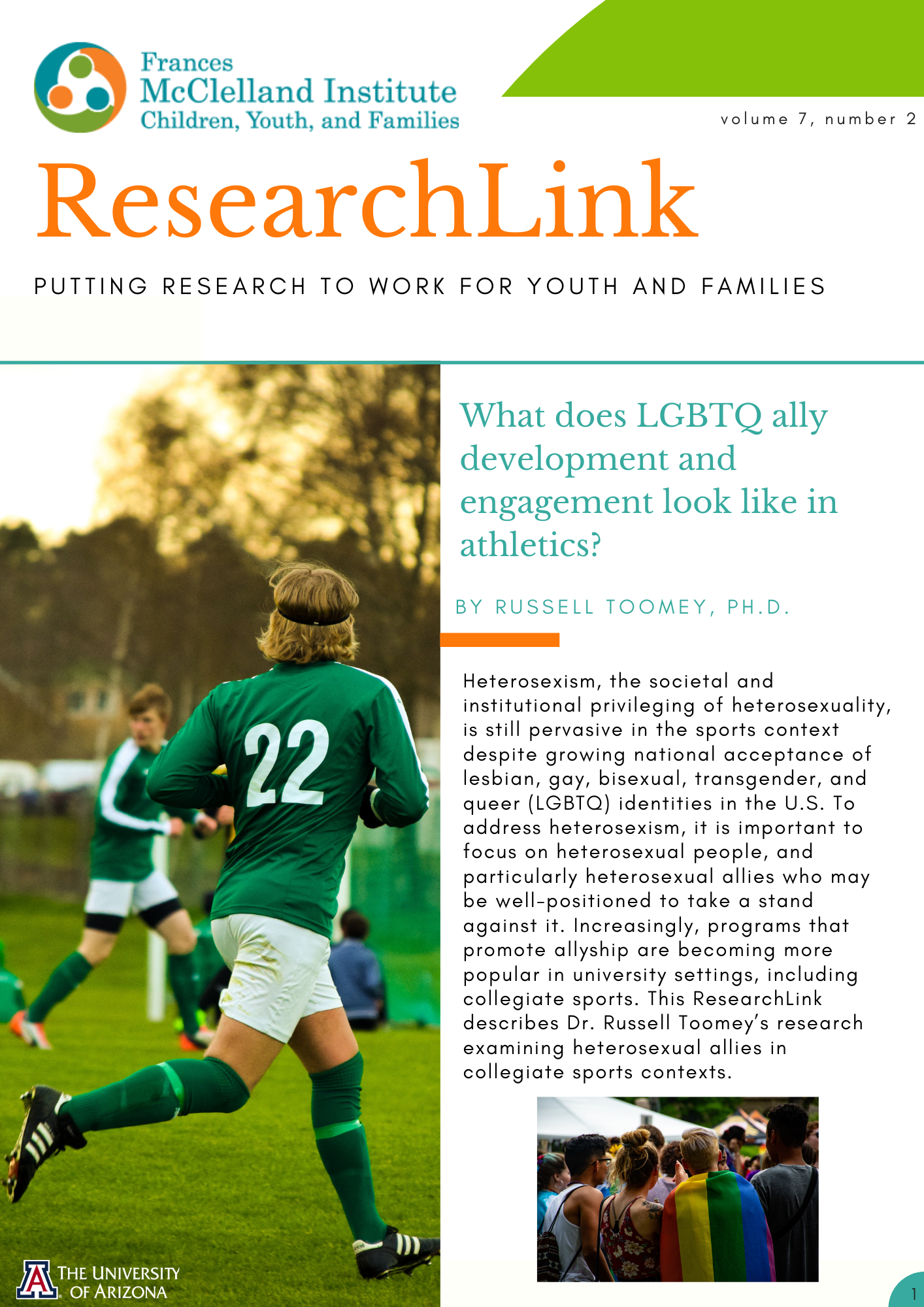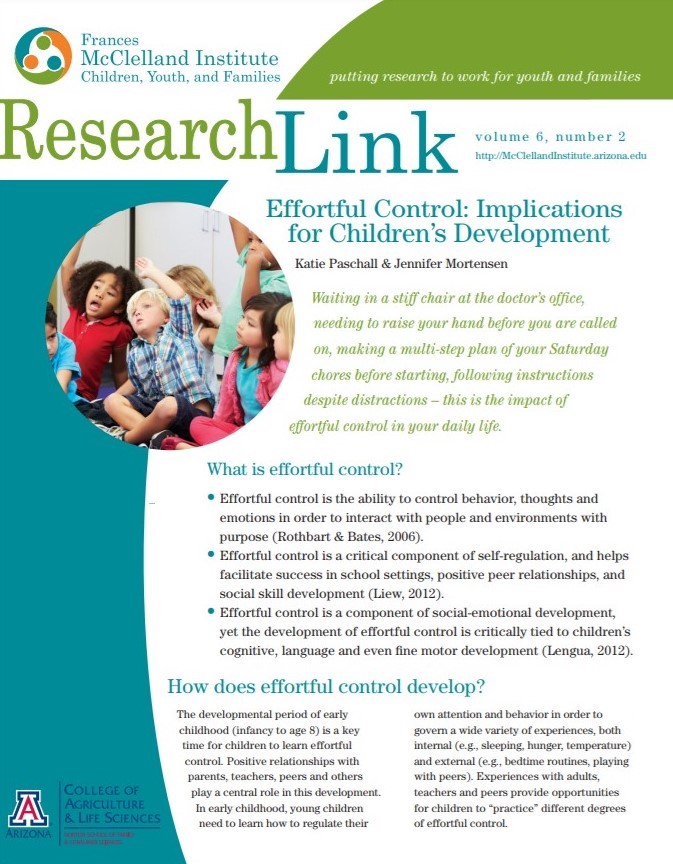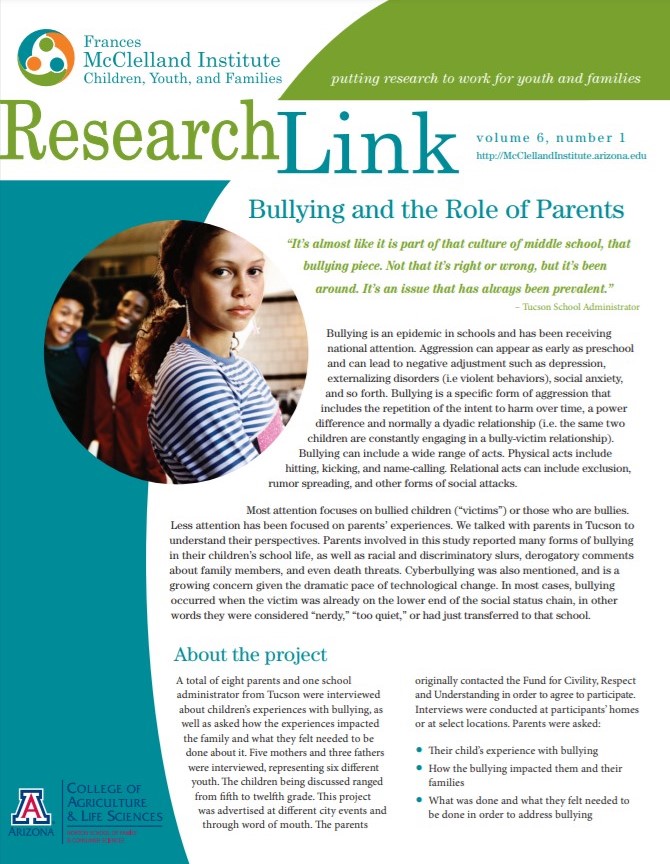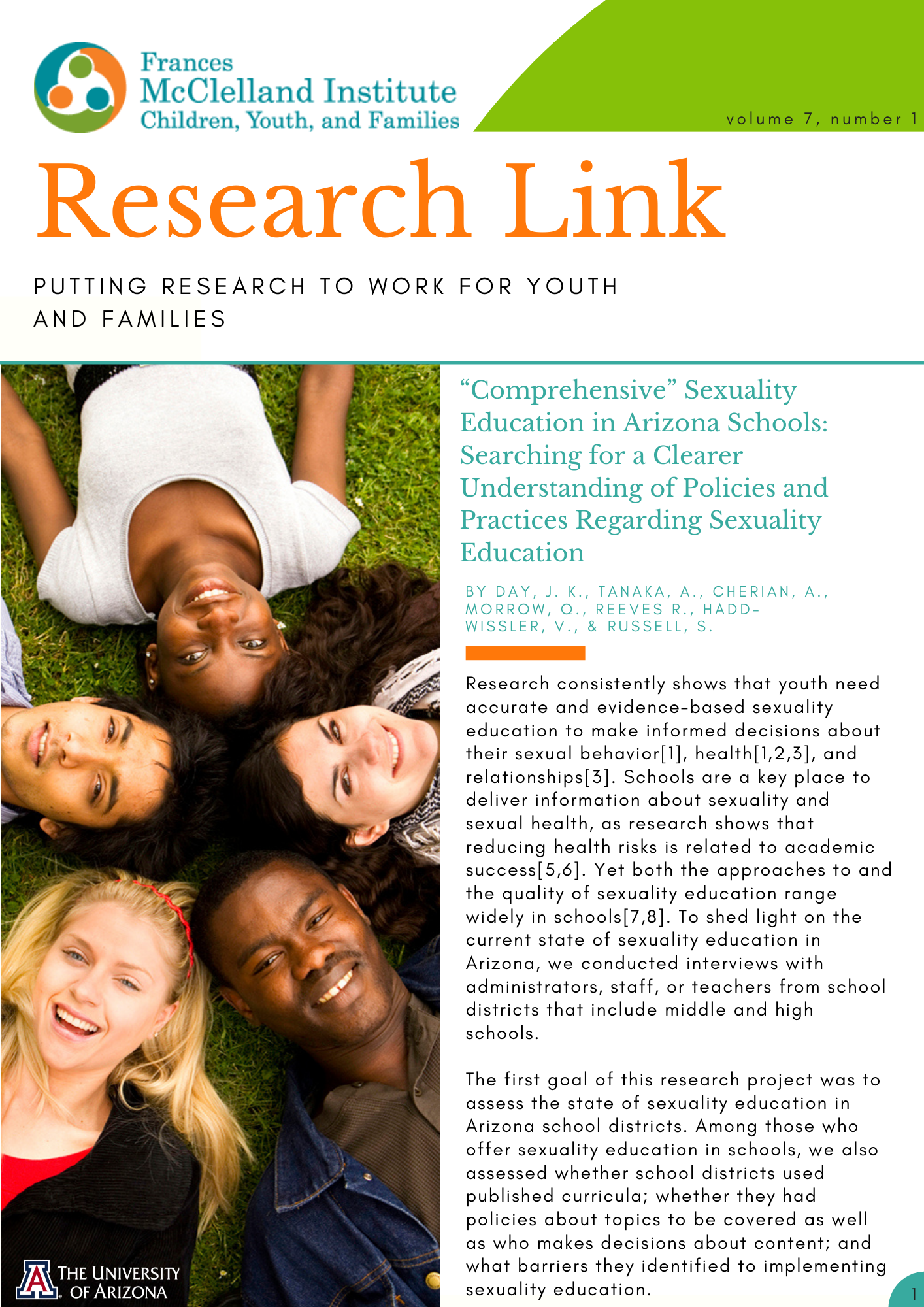Research Link brings you up-to-date on the activities of the Frances McClelland Institute for Children, Youth, and Families --- putting research to work for youth and families. The publication is designed to translate the research of the Institute into a user-friendly format suitable for parents, teachers, policy makers, and youth and family professionals.
 Vol. 7, No. 2 - What does LGBTQ ally development and engagement look like in athletics?
Vol. 7, No. 2 - What does LGBTQ ally development and engagement look like in athletics?
This volume of Research Link discusses LGBTQ ally development and enegament in sports contexts.
About: Heterosexism, the societal and institutional privileging of heterosexuality, is still pervasive in the sports context despite growing national acceptance of lesbian, gay, bisexual, transgender, and queer (LGBTQ) identities in the U.S. To address heterosexism, it is important to focus on heterosexual people, and particularly heterosexual allies who may be well-positioned to take a stand against it. Increasingly, programs that promote allyship are becoming more popular in university settings, including collegiate sports. This ResearchLink collegiate sports contexts.
This volume of Research Link sheds light on the current state of sexuality education in the state of Arizona, and give some recommendations on how we can improve sexuality education in our state. You can find the corresponding infographic here.
 Vol. 6, No. 2 - Effortful Control: Implications for Children Development
Vol. 6, No. 2 - Effortful Control: Implications for Children Development
Waiting in a stiff chair at the doctor’s office, needing to raise your hand before you are called on, making a multi-step plan of your Saturday chores before starting, following instructions despite distractions – this is the impact of effortful control in your daily life.
 Vol. 6, No. 1 - Bullying and the Role of Parents
Vol. 6, No. 1 - Bullying and the Role of Parents
Bullying is an epidemic in schools and has been receiving national attention. Aggression can appear as early as preschool and can lead to negative adjustment such as depression, externalizing disorders (i.e violent behaviors), social anxiety, and so forth. Bullying is a specific form of aggression that includes the repetition of the intent to harm over time, a power difference and normally a dyadic relationship (i.e. the same two children are constantly engaging in a bully-victim relationship). Bullying can include a wide range of acts. Physical acts include hitting, kicking, and name-calling. Relational acts can include exclusion, rumor spreading, and other forms of social attacks.
Vol. 5, No. 1 - How Caregiving Impacts the Caregiver: Influences in the Caregiving of Elderly Family Members
Two studies highlight how person-, family-, and context-level characteristics matter in the experience of caregivers who care for elderly family members. The first study examined responses of caregivers when faced with care-related stressors. This study showed that caregivers with low levels of support and high numbers of non-care related stressors experience daily care-related stressors more intensely. The second study examined how familism beliefs influence Hispanic caregivers' responses to family conflict/disagreements about the care situation. This study found that stronger familism beliefs increase negative responses to daily care-related family disagreements as seen in greater depressive and physical symptoms. Because of these findings, a new study is currently under way to further understand family dynamics for Hispanic caregiving families.
Vol. 4, No. 3 Compassion Training as a Pathway to Lifelong Health & Well-Being
Two studies highlight how person-, family-, and context-level characteristics matter in the experience of caregivers who care for elderly family members. The first study examined responses of caregivers when faced with care-related stressors. This study showed that caregivers with low levels of support and high numbers of non-care related stressors experience daily care-related stressors more intensely. The second study examined how familism beliefs influence Hispanic caregivers' responses to family conflict/disagreements about the care situation. This study found that stronger familism beliefs increase negative responses to daily care-related family disagreements as seen in greater depressive and physical symptoms. Because of these findings, a new study is currently under way to further understand family dynamics for Hispanic caregiving families.
Vol. 4, No. 2 Women's Weight and Emotions: The Impact on Relationships and Eating Behaviors
A new study shows that overweight women may hide negative emotions from male partners in order to please them; doing so may have both rewards and costs. When heavier women hide their emotions, their partners report fewer bad feelings toward them; but to cope with unexpressed negativity, the women may then overeat. The reverse is true for thinner women who hide their emotions: their partners report having more bad feelings toward them; but these women do not overeat.
Vol. 4, No. 1 How School Bullying Impacts Lesbians, Gay, Bisexual, and Transgender (LGBT) Young Adults
Two new studies shed light on the long-term effect of school bullying.The first study explored the impact of bulling of LGBT teens and found bullying to be related to health and adjustment differences in adulthood. The second study found that LGBT teen gender nonconformity is linked to more bullying; however, only bullying, and not teen gender nonconformity, was found to be related to well-being in adulthood. These findings highlight the long term impact bullying has on LGBT individuals.
Vol. 3, No. 1 What Do Relationships of Expectant Cohabitors Look Like?
Three new studies shed light on the nature of relationships in which unmarried couples living together are expecting their first child. Both male and female partners were interviewed about (1) relationship commitment, (2) relationship talk, and (3) sacrifices they make for each other or their relationship. Women whose male partners reported low commitment had more symptoms of depression. Men whose female partners reported more daily hassles and sacrifices felt less satisfied with the relationship. Yet when partners talked about their relationship, most used language that reflected commitment (e.g., “We” versus “I”). These findings highlight how diverse and complex cohabiting couples are; they also show that men and women may experience cohabitation differently.
Vol. 2, No. 4 How Families Cope with Cancer
A new book provides families with information to understand and help loved ones diagnosed with cancer.Blending research and stories from cancer survivors, family caregivers, and social workers, the book shows how diverse families have coped with and foundmeaning from the illness. It also provides help finding financial assistance, support groups, and counseling. Together, the book’s authors offer insight into how a cancer diagnosis affects co-survivors and hope for managing the treatment process within families.
Vol. 2, No. 3 A Roadmap for Young Adults' Financial Well-Being
A diverse team of researchers offers a new model for understanding what factors shape young people’s financial decisionmaking and well-being. Two studies highlight links between the role of parents, work, and education and young people’s positive financial habits. These findings guide a long-range project to look at how individuals’ financial behaviors develop and change over time.
Vol. 2, No. 2 Addressing Teen Sexual Violence Through Prevention Education
There is a critical need for prevention education about rape and sexual assault for teenagers. Over the last 10 years, a professional collaboration to prevent sexual violence developed curricula for adolescents. Lessons are targeted for use in schools and afterschool settings to give youth accurate information and prevention skills. Many challenges exist for training professionals to use the material and for getting permission to bring it into classrooms and other youth programs. Yet evidence from using the curricula shows that when adolescents have accurate information, they have a better understanding of sexual violence.
Vol. 2, No. 1 Cultural Differences in Parenting Practices: What Asian American Families Can Teach Us
In the United States, what most people consider good parenting is based on middle class European American behaviors. These behaviors include displays of warmth and closeness balanced with monitoring and control. A new book edited by Dr. Stephen T. Russell, Fitch Nesbitt Endowed Chair, and director of the Frances McClelland Institute for Children, Youth and Families, highlights important parenting differences between European and Asian Americans. At first glance, Asian American parents appear to show less warmth and to be more controlling of their children. Yet their children often do just as well as their European counterparts. Their parenting style may reflect differences in what warmth and control mean in their culture. Such differences suggest that existing ideas about parenting may not fit all populations of youth and their families. Studies of Asian American families shed light on new dimensions of parenting that matter for all families.
Vol. 1, No. 6 Living in Two Cultures: Implications for Latino Adolescent Health
Three studies reveal the impact of bicultural stress on Latino youth in the United States. Both immigrant and U.S.-born Latino youth face pressure to adopt the majority culture and preserve their culture of origin. They must cope with unfair treatment, cultural differences in their families, and pressure to become bilingual. The more they perceive these pressures as stressful, the more likely they are to suffer from depression and engage in risky behavior.
Vol. 1, No. 5 Teacher-Child Relationship Quality and Classroom Adjustment: Does Gender Matter?
A new study shows that the quality of teacher-child relationships influences preschool girls’ and boys’ adjustment to the classroom differently. When children experience high conflict with teachers, boys but not girls tend to behave more aggressively. When children have a close relationship with teachers, girls but not boys develop more social competence; that is, girls display what teachers consider traits of the “ideal” student.
Vol. 1, No. 4 Youth Programs Foster Citizenship
This study shows how involvement in a youth-led program can promote citizenship. From conversations with youth participants, researchers created a three-phased model to describe this process. First, young people find their way to the center and take part in programs. Second, they connect to their peers and find meaningful ways to contribute. Third, they expand their awareness of and involvement in the larger community.
Vol. 1, No. 3 Early Experience with High-Risk Fathers Changes Puberty in Daughters
A new study shows that girls get their first period earlier when they experience disruptive homes in early childhood. When a girl starts life with a high-risk father in the home, and then a divorce occurs and that father leaves, her timing of puberty changes. Her first menstruation occurs 11 months earlier than does either her older sister’s or other girls’ from divorced families whose fathers do not display high-risk behaviors.
Vol. 1, No. 2 Aggression Among Teens: Dispelling Myths About Boys and Girls
A new study dispels the popular belief that girls are more likely than boys to hurt other children through gossip, rumor, and social rejection. While boys do tend to hit, push, and call their peers names more than girls do, they are just as likely as girls to hurt other kids socially.
Vol. 1, No. 1 Preventing Latina Teen Pregnancy: Challenges and Solutions for Practitioners
Two studies look at Latino teenage pregnancy prevention from a new angle. They focus on the perspective of professionals who work in Latino teen pregnancy programs rather than of the teenagers themselves. Practitioners discuss the importance of differentiating between U.S. mainstream culture and the culture and experiences of Latino youth and their families. They also stress the need for program staff to be culturally sensitive and to include male partners in pregnancy prevention strategies.


 Vol. 7, No. 1
Vol. 7, No. 1 





.png)